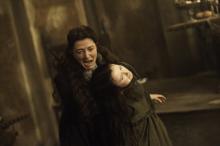sexually explicit television

Is there anything morally redeeming about Game of Thrones? Does the hit HBO series even have a moral vision?
The show is certainly entertaining, almost addictively so, and as Game of Thrones wraps up its third season on Sunday, the ratings reflect that popularity: a record of more than 5.5 million viewers have followed the ruthless struggles for power among the teeming clans of Westeros, the medieval-looking world created by fantasy novelist George R.R. Martin.
That success has also guaranteed that the show will be back for a fourth year of mayhem and passion, swords and sorcery, despite this season’s many violent endings. Or, as one tweet put it after the bloody penultimate episode: “Why doesn’t George R.R. Martin use twitter? Because he killed all 140 characters.”
But therein lies the moral problem for some: The appeal of the series seems bound up in the senseless violence and amoral machinations – not to mention the free-wheeling sex – that the writers use to dramatize this brutish world of shifting alliances and dalliances.
That, in turn, has prompted intense debates about whether Christians should watch Games of Thrones at all, or whether the show’s only possible virtue is depicting how the world would look if Christ had never been born – or what it could look like if Christianity disappeared tomorrow.